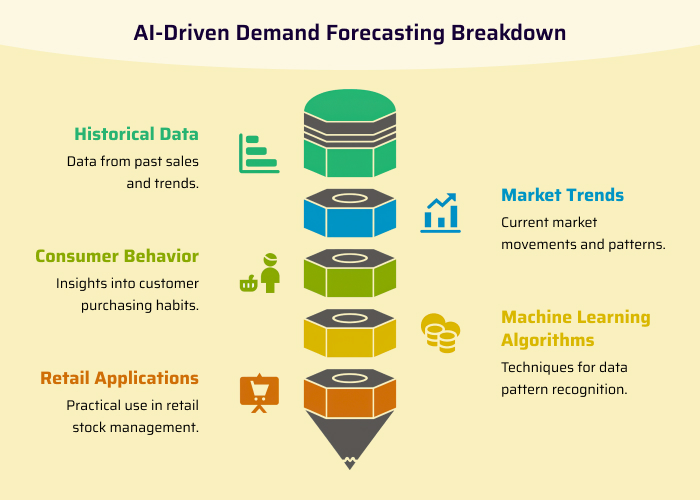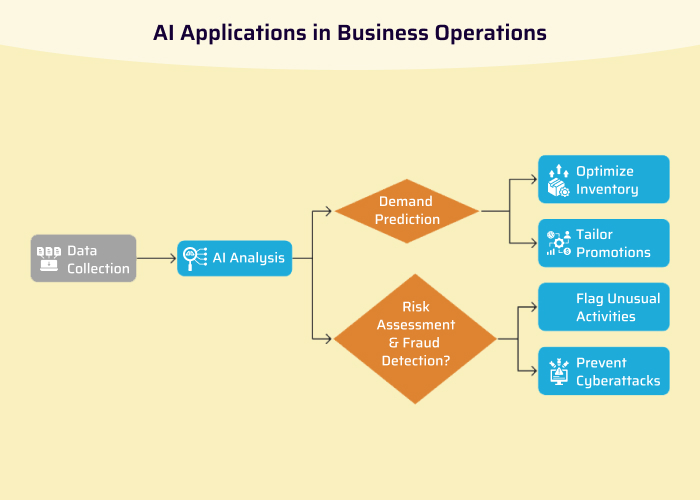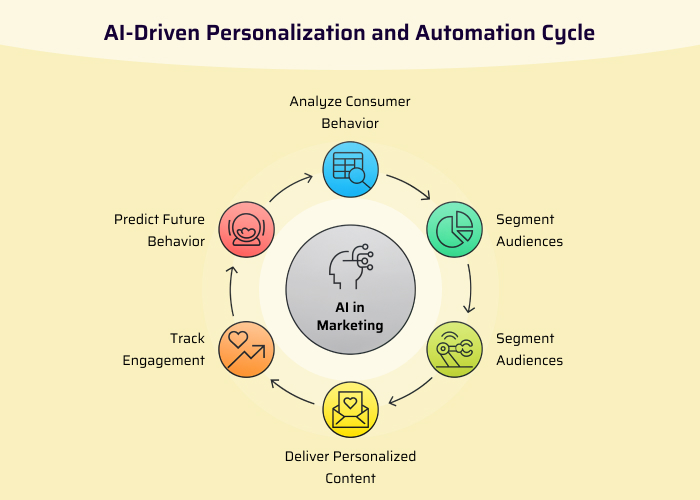In today’s fast-paced digital world, data is no longer just an asset – it’s a necessity. But data alone doesn’t drive success. The true power lies in how businesses analyze and act on it. Enter AI-Driven predictive analytics – a game changer that’s helping businesses make smarter, faster, and more informed decisions.
From forecasting demand to fighting fraud, AI is rewriting the rulebook of business strategy. Let’s dive into how predictive analytics is revolutionizing industries and unlocking a new era of intelligent decision making.
AI-Driven Analytics for Demand Forecasting

Demand forecasting is a critical component for businesses aiming to optimize inventory management and meet customer expectations. AI-driven analytics utilizes historical data, market trends, and consumer behavior to predict future demand with remarkable accuracy. By employing machine learning algorithms, businesses can analyze vast datasets to identify patterns and correlations that human analysts might overlook.
For instance, retailers can anticipate seasonal trends and adjust their stock levels accordingly, minimizing overstock and stockouts. Companies like Amazon and Walmart have successfully implemented AI for demand forecasting, allowing them to streamline operations and enhance customer satisfaction.
Forecasting the future: Demand prediction with AI

Imagine if businesses could predict what customers want before they even know it themselves. That’s exactly what AI-powered demand forecasting is making possible.
Using historical data, seasonal trends, and external factors like weather or economic shifts, AI models analyze patterns to accurately predict future demand. Retailers, for instance, can optimize inventory, avoid overstocking or understocking, and tailor promotions based on real-time demand projections.
Example:
Amazon uses predictive analytics to anticipate product demand at a hyper-local level, ensuring products are in the right place at the right time – boosting customer satisfaction and reducing logistics costs.
Smarter Risk Assessment & Fraud Detection
For industries like finance and insurance, every decision comes with a risk. That’s why AI is becoming the secret weapon for risk assessment and fraud detection.
By analyzing customer data, credit history, and behavioral patterns, AI models can flag unusual activities or potential risks in real-time. These insights help companies make informed lending decisions, detect fraudulent claims, and even prevent cyberattacks before they occur.
Example:
Banks and fintech companies now rely on AI to spot fraudulent transactions within milliseconds, far quicker and more accurately than traditional rule-based systems.
Personalization at Scale: Marketing Automation with AI

Gone are the days of one-size-fits-all marketing. Today’s customers expect personalization – and AI delivers it with precision. The integration of AI in marketing automation has revolutionized how businesses engage with their customers. AI-driven tools can analyze consumer behavior and preferences to deliver personalized content and recommendations.
Through predictive analytics, businesses can segment audiences, track engagement, and predict future behavior. This allows them to automate marketing efforts and deliver personalized content at the right moment on the right channel.
Example:
1. E-commerce platforms like Shopify leverage AI to create tailored marketing campaigns based on user behavior, leading to higher engagement and sales.
2. Netflix uses predictive algorithms to suggest shows based on your viewing history, while Spotify curates personalized playlists that keep users hooked – all thanks to AI.
Real-World Applications Across Industries
The applications of AI and predictive analytics span across various industries, each reaping unique benefits:
- Finance: In the finance sector, AI is used for credit scoring, risk management, and algorithmic trading. Companies like Goldman Sachs employ AI to analyze market trends and make data-driven investment decisions.
- Healthcare: AI-driven predictive analytics is transforming healthcare by predicting patient outcomes, optimizing treatment plans, and managing hospital resources. For example, hospitals use AI to forecast patient admissions, ensuring they are adequately staffed and equipped.
- ERP Systems: AlianHub is revolutionizing project management within ERP systems by embedding AI-driven features. Their platform offers AI-assisted task creation, where users can generate tasks, subtasks, descriptions, and checklists through simple prompts. This not only accelerates project setup but also ensures comprehensive planning. Additionally, AlianHub’s AI capabilities extend to workload management, project cost calculation, and time-tracking, providing a holistic solution for businesses aiming to optimize their operations.
Alian Hub
The Feedback Loop of Improvement
What makes AI so powerful is its ability to learn continuously. As it ingests more data over time, it refines its models, making predictions more accurate and decision-making more impactful. It’s a self-improving engine that keeps getting better.
Conclusion
Predictive analytics isn’t just a futuristic concept—it’s already here, and it’s reshaping how businesses operate. By leveraging AI, companies can:
- Reduce guesswork
- Minimize risks
- Maximize opportunities
- Delight customers
In a world where data is abundant but attention is scarce, AI gives businesses the clarity they need to act with confidence. Whether you’re in finance, healthcare, retail, or beyond—those who embrace predictive analytics are not just staying ahead of the curve, they’re defining it.
Ravi Bhojani is the Chief Marketing Officer (CMO) at Alian Software, where he spearheads the company’s marketing strategies and drives its brand presence in the competitive IT services landscape. With over a decade of experience in the technology and marketing sectors, Ravi has consistently demonstrated his ability to blend innovative marketing techniques with deep industry knowledge to deliver outstanding results.